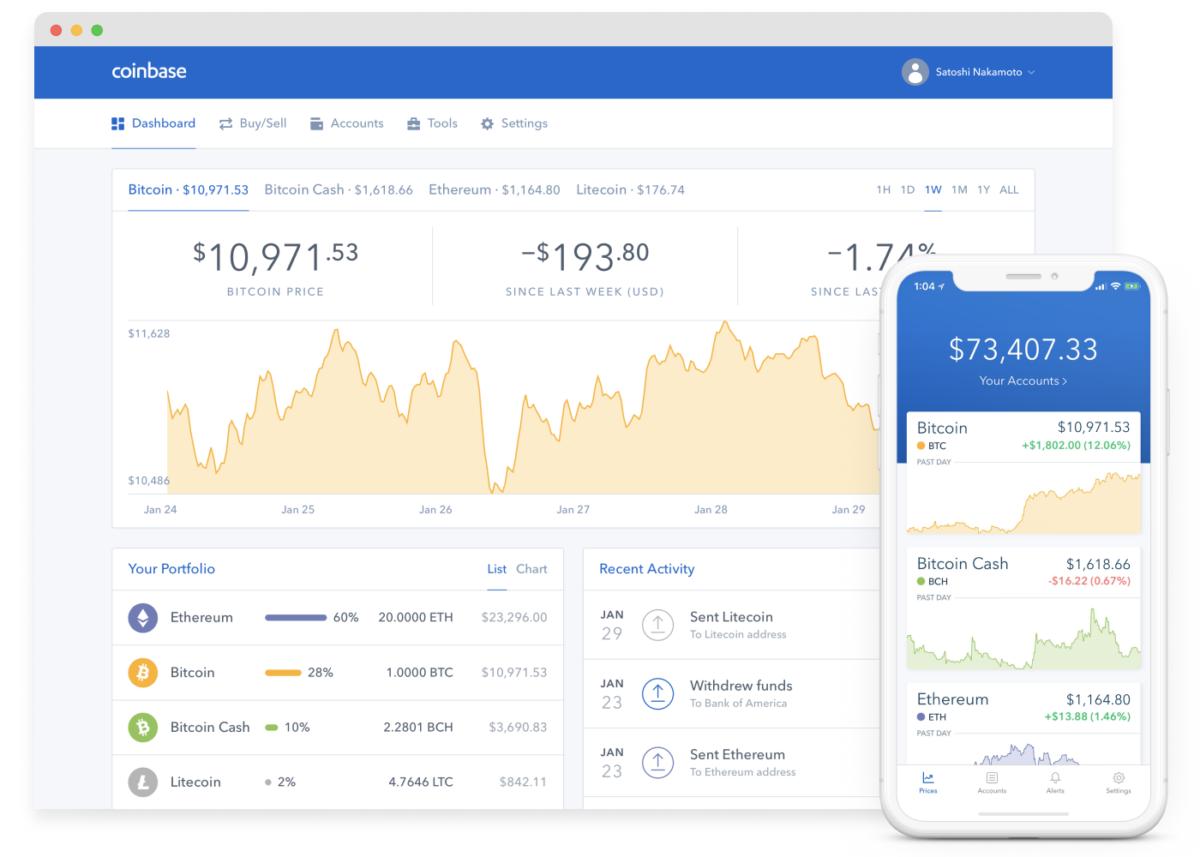A blockchain bitcoin wallet is a digital wallet that allows you to securely store and manage your bitcoin cryptocurrency. Bitcoin is a decentralized digital currency that operates on a peer-to-peer network called the blockchain, which is a distributed ledger that records all transactions.
Blockchain technology enables secure and transparent transactions, as each transaction is verified by network participants and added to a block in the blockchain. This ensures that the transaction is valid and cannot be altered or reversed without the consensus of the network.
A bitcoin wallet is essentially a software program that allows you to interact with the blockchain and manage your bitcoin. It uses cryptographic keys, which are generated and stored securely in the wallet, to sign transactions and provide access to your bitcoin. These keys are used to prove ownership of bitcoin and authorize transactions.
There are different types of bitcoin wallets available, including hardware wallets, software wallets, and online wallets. Hardware wallets are physical devices that store your bitcoin keys offline, providing an extra layer of security. Software wallets are applications that are installed on your computer or mobile device. Online wallets are web-based wallets that allow you to access your bitcoin from any device with an internet connection.
It is important to choose a bitcoin wallet that suits your needs and provides a high level of security. It is recommended to use a wallet that allows you to have full control over your keys and provides backup and recovery options. Additionally, it is important to keep your wallet and keys secure, by using strong passwords, enabling two-factor authentication, and regularly backing up your wallet.
- Understanding Distributed Ledger Bitcoin Wallets
- What is a Bitcoin Wallet?
- Introduction to Distributed Ledger
- How Distributed Ledger Bitcoin Wallets Work?
- Benefits of Using a Distributed Ledger Bitcoin Wallet
- Benefits of Using a Distributed Ledger Bitcoin Wallet
- How to Choose the Best Digital Currency Wallet
- Key Features of a Cryptocurrency Wallet
- Different Types of Cryptocurrency Wallets
- 1. Digital Wallets
- 2. Web Wallets
- 3. Hardware Wallets
- 4. Paper Wallets
- 5. Mobile Wallets
- 6. Desktop Wallets
- Security Measures for Blockchain Bitcoin Wallets
- Introduction
- Importance of Security
- Best Security Practices for Bitcoin Wallets
- Frequently Asked Questions (FAQs)
- Conclusion
- Managing Multiple Digital Currencies in a Single Wallet
- The Benefits of a Distributed Wallet
- Choosing the Right Distributed Wallet
- In Conclusion
- The Future of Blockchain Bitcoin Wallets
- 1. Enhanced Security
- 2. Increased Usability
- 3. Integration with Traditional Banking
- 4. Decentralized Wallets
- 5. Interoperability
- Conclusion
- “Frequently Asked Questions:
- What is a blockchain bitcoin wallet?
- How does a cryptocurrency wallet work?
- What is a distributed ledger bitcoin wallet?
- What are the advantages of using a digital currency wallet?
- Are there different types of bitcoin wallets?
- Videos:”
- Crypto Wallets Explained (Beginners’ Guide!) How to Get Crypto Off Exchange Step-by-Step ✔️
- What are Crypto Wallets|Explained for beginners
Understanding Distributed Ledger Bitcoin Wallets
In the world of cryptocurrencies, Bitcoin is the most well-known and widely used currency. Bitcoin operates on a decentralized system known as a blockchain. To safely store and manage Bitcoin, users use digital wallets.
What is a Bitcoin Wallet?

A Bitcoin wallet is a digital wallet that allows users to securely store and manage their Bitcoin. It essentially acts as a virtual bank account for cryptocurrency. A Bitcoin wallet contains private keys, which are used to access and transfer Bitcoin. It also keeps a record of all transactions made.
Introduction to Distributed Ledger
A distributed ledger is a database that is shared and synchronized across multiple computers or nodes. In the context of Bitcoin, a distributed ledger refers to the blockchain. Instead of being stored on a single server or controlled by a central authority, the blockchain is distributed among various nodes in the network.
The distributed nature of the blockchain ensures that there is no single point of failure or vulnerability. This means that even if one node goes down or gets compromised, the network as a whole remains secure and operational.
How Distributed Ledger Bitcoin Wallets Work?
A distributed ledger Bitcoin wallet utilizes the blockchain to store and manage Bitcoin. When a user makes a transaction, the wallet creates a new block containing the transaction details. This block is then broadcasted to all the nodes in the network for verification.
Once the block is verified by the majority of nodes, it is added to the blockchain, thus making the transaction permanent and irreversible. Each wallet in the network has a copy of the blockchain, ensuring that all transactions are recorded and can be traced back if needed.
Benefits of Using a Distributed Ledger Bitcoin Wallet
- Security: The distributed nature of the blockchain provides a high level of security. It is extremely difficult for malicious actors to tamper with the blockchain, making distributed ledger Bitcoin wallets highly secure.
- Transparency: As the blockchain is distributed among multiple nodes, all transactions are transparent and can be verified by anyone. This increases the trust and accountability in the Bitcoin ecosystem.
- Decentralization: Since the blockchain is not controlled by a central authority, distributed ledger Bitcoin wallets promote decentralization. This means that no single entity has control over the entire network, ensuring a more democratic and inclusive financial system.
Overall, understanding distributed ledger Bitcoin wallets is crucial for anyone interested in the world of cryptocurrencies. It provides a secure and transparent way to store and manage Bitcoin, while also promoting the values of decentralization and trust in the digital currency ecosystem.
Benefits of Using a Distributed Ledger Bitcoin Wallet
A distributed ledger Bitcoin wallet offers several advantages over traditional wallets, making it a popular choice among digital currency enthusiasts. Here are some of the key benefits:
- Enhanced Security: With a distributed ledger Bitcoin wallet, your digital assets are stored on a decentralized network rather than a single server or device. This makes it more difficult for hackers or malicious actors to gain unauthorized access to your funds.
- Transparency and Immutability: The use of a distributed ledger, such as blockchain, ensures that every transaction on the Bitcoin network is transparent and cannot be altered. This provides a high level of trust and helps prevent fraudulent activities.
- Ownership and Control: By using a distributed ledger wallet, you have full ownership and control over your Bitcoin. There is no need to rely on third-party intermediaries, such as banks, to store or manage your digital assets.
- Decentralization: Distributed ledger technology allows for a decentralized network, removing the need for a central authority to validate transactions. This reduces the risk of censorship, as no single entity has control over the network.
- Global Accessibility: Bitcoin is a global cryptocurrency, and a distributed ledger wallet enables users to access their funds from anywhere in the world, as long as they have an internet connection. This makes it convenient for international transactions.
- Compatibility with Other Cryptocurrencies: Many distributed ledger wallets support not only Bitcoin but also other cryptocurrencies. This allows users to manage and store different digital assets in a single wallet, simplifying the management process.
In conclusion, a distributed ledger Bitcoin wallet provides enhanced security, transparency, ownership, and control over your digital assets. It offers the benefits of decentralization, global accessibility, and compatibility with other cryptocurrencies. Considering these advantages, it is no wonder why distributed ledger wallets have gained popularity among cryptocurrency users.
How to Choose the Best Digital Currency Wallet
When it comes to storing and managing your digital currency, having a reliable and secure wallet is crucial. With the rise of cryptocurrencies like Bitcoin, there are now numerous wallet options available. Here are a few factors to consider when choosing the best digital currency wallet:
- Security: The most important aspect of a digital currency wallet is its security. Look for wallets that offer strong encryption and two-factor authentication to keep your funds safe from hackers.
- User-Friendliness: A good wallet should be easy to use, even for beginners. Look for wallets with intuitive interfaces and clear instructions to make managing your cryptocurrency simple.
- Compatibility: Ensure that the wallet you choose is compatible with the digital currency you want to store. Some wallets may only support certain cryptocurrencies, so make sure it can handle your preferred currency.
- Backup and Recovery: Accidents happen, and you don’t want to lose your funds due to a technical issue or a lost device. Look for wallets that offer backup and recovery options to protect your funds.
- Community and Support: Joining a vibrant community of users can provide valuable support and resources. Look for wallets with active communities and strong customer support to assist you if any issues arise.
By considering these factors, you can choose the best digital currency wallet for your needs. Remember, it’s essential to prioritize security and usability when it comes to managing your cryptocurrency.
Key Features of a Cryptocurrency Wallet

A cryptocurrency wallet is a digital wallet that allows users to store, send, and receive digital currency. It is an essential tool for anyone looking to enter the world of cryptocurrencies, such as Bitcoin. Here are some key features of a cryptocurrency wallet:
- Security: One of the most crucial aspects of a cryptocurrency wallet is its security. As digital currencies like Bitcoin operate on a distributed ledger called blockchain, it is essential to choose a wallet that provides robust security measures to protect your funds from unauthorized access.
- Private Key Management: A cryptocurrency wallet generates and stores a pair of cryptographic keys, consisting of a public key and a private key. The private key is crucial for accessing and managing your funds. It is important to choose a wallet that allows you to securely store and manage your private keys.
- Compatibility: Cryptocurrency wallets can come in various forms, including desktop, mobile, web-based, and hardware wallets. It is essential to choose a wallet that is compatible with your preferred device and operating system.
- User-Friendly Interface: A good cryptocurrency wallet should have a user-friendly interface that makes it easy for users to navigate and perform essential functions such as sending and receiving funds. The wallet should also provide clear information about the account balance and transaction history.
- Backup and Recovery: As with any digital data, it is crucial to have a backup of your wallet and recovery options in case of any accidents or device failures. Many wallets provide options for backing up and recovering your wallet using a mnemonic phrase or a recovery seed.
- Multi-Currency Support: While some wallets are designed specifically for a particular currency like Bitcoin, others support multiple cryptocurrencies. If you plan to hold different types of digital currencies, it is crucial to choose a wallet that supports them.
- Transaction Fees: Cryptocurrency wallets may charge transaction fees for sending funds. It is important to consider the fee structure of the wallet and choose one that offers reasonable and transparent transaction fees.
- Community and Development: It is beneficial to choose a cryptocurrency wallet that has an active and supportive community. A wallet backed by a dedicated development team ensures regular updates and bug fixes, enhancing the security and functionality of the wallet.
Choosing the right cryptocurrency wallet is essential for securely managing your digital currency. Consider these key features when selecting a wallet that meets your needs and offers the necessary security and convenience.
Different Types of Cryptocurrency Wallets
When it comes to storing and managing digital currencies like Bitcoin and other cryptocurrencies, there are various types of wallets available. These wallets are designed to securely hold the digital assets and provide access to them when needed. Here are some of the different types of cryptocurrency wallets:
1. Digital Wallets
Digital wallets are software applications that can be installed on a computer or mobile device. These wallets are commonly used for storing and managing Bitcoin and other cryptocurrencies. They provide users with a digital address, which is needed to send and receive digital currency transactions. Digital wallets can be either hot wallets or cold wallets.
2. Web Wallets
Web wallets are online wallets that can be accessed through a web browser. These wallets are usually hosted by a third party, making them convenient to use from any device with an internet connection. Web wallets are considered to be less secure than other types of wallets because the private keys are stored on the server of the wallet provider.
3. Hardware Wallets
Hardware wallets are physical devices that store a user’s private keys offline. They are designed to provide maximum security by keeping the private keys away from internet-connected devices. Hardware wallets are considered to be one of the most secure ways to store cryptocurrencies since they are not susceptible to malware or hacking.
4. Paper Wallets

A paper wallet is a physical printout or written record that contains a user’s public and private keys. It is considered to be one of the most secure ways to store cryptocurrencies since it is completely offline and not vulnerable to hacking. However, paper wallets can be easily lost or damaged, so it is important to keep them in a safe place.
5. Mobile Wallets
Mobile wallets are smartphone applications that allow users to store and manage their cryptocurrencies on their mobile devices. These wallets are convenient for everyday use as they can be easily accessed and used for making transactions on the go. Mobile wallets can be either software wallets or hardware wallets connected to the mobile device.
6. Desktop Wallets
Desktop wallets are software applications that are installed and run on a desktop computer. These wallets provide users with full control over their private keys and offer a high level of security. Desktop wallets are not dependent on a third party since the private keys are stored locally on the user’s computer.
It is important to choose the right type of wallet that suits your needs and preferences. Each type of wallet has its own advantages and disadvantages, so it is crucial to consider factors like security, convenience, and accessibility when selecting a cryptocurrency wallet.
Security Measures for Blockchain Bitcoin Wallets
Introduction
A cryptocurrency wallet is a digital wallet that allows users to securely store and manage their digital assets, such as Bitcoin or other cryptocurrencies. It enables users to interact with the blockchain, perform transactions, and keep track of their balances.
Importance of Security
Since Bitcoin and other cryptocurrencies are digital currencies, they are vulnerable to various security threats, such as hacking, malware attacks, and phishing attempts. It is crucial to implement robust security measures to protect your Bitcoin wallet from unauthorized access and potential loss of funds.
Best Security Practices for Bitcoin Wallets
- Choose a reputable wallet provider: Select a trusted and well-established wallet provider with a proven track record in security.
- Enable two-factor authentication (2FA): Use 2FA to add an extra layer of security to your wallet. It typically requires a second verification step, such as a code sent to your mobile device, to access your wallet.
- Use strong and unique passwords: Create a strong password for your wallet and avoid using the same password for multiple accounts.
- Keep your wallet software up to date: Regularly update your wallet software to benefit from the latest security patches and enhancements.
- Backup your wallet: Regularly create backups of your wallet and store them in secure locations. This ensures that you can recover your funds in case of device loss or failure.
- Use a hardware wallet: Consider using a hardware wallet, which is a physical device that securely stores your private keys offline. It offers enhanced protection against online threats.
- Be cautious with online transactions: Verify the authenticity and security of websites or platforms before making any online transactions. Look for the HTTPS protocol and a lock icon in the address bar.
Frequently Asked Questions (FAQs)
-
Can a Bitcoin wallet be hacked?
While Bitcoin wallets are generally secure, they can still be vulnerable to hacking if proper security measures are not implemented. It is essential to follow best practices and keep your wallet software up to date to minimize the risk of hacking.
-
What happens if I lose access to my Bitcoin wallet?
If you lose access to your Bitcoin wallet, you may lose your funds permanently. It is crucial to keep backups of your wallet and store them in secure locations. Additionally, consider implementing additional security measures, such as 2FA or using a hardware wallet.
-
Are there any insurance options for Bitcoin wallets?
While traditional insurance policies do not typically cover cryptocurrency losses, there are a few specialized cryptocurrency insurance providers emerging in the market. These providers offer insurance coverage for digital asset losses, including theft or hacking of Bitcoin wallets.
Conclusion
Security is of utmost importance when it comes to Bitcoin wallets. By following the best security practices and staying vigilant, you can protect your digital assets from potential threats. Remember to choose a reputable wallet provider, enable 2FA, use strong passwords, keep your wallet software up to date, and consider using a hardware wallet for enhanced protection. By implementing these security measures, you can confidently manage your Bitcoin wallet and keep your funds safe.
Managing Multiple Digital Currencies in a Single Wallet
In the world of digital currency, having a reliable and secure wallet is essential. A wallet is a digital ledger that stores your digital currencies, such as Bitcoin and other cryptocurrencies, and allows you to manage and transact with them.
Traditionally, users had to use separate wallets for each type of digital currency they held. This meant having multiple wallets and managing each one individually, which could be cumbersome and inconvenient.
However, with the advent of blockchain technology, managing multiple digital currencies in a single wallet has become much more streamlined and user-friendly.
The Benefits of a Distributed Wallet
A distributed wallet is a type of wallet that allows users to store and manage multiple digital currencies in a single place. This type of wallet leverages the power of blockchain technology to securely store and transact with different types of digital currencies.
Here are some of the benefits of using a distributed wallet:
- Convenience: Having a single wallet for all your digital currencies makes it easier to manage and transact with them. You don’t need to switch between different wallets or remember different passwords.
- Security: A distributed wallet uses blockchain technology to provide a high level of security. Each transaction is recorded on a distributed ledger, making it difficult to tamper with or hack.
- Cost Savings: Using a distributed wallet eliminates the need for multiple wallets, which can save you money in transaction fees. It also simplifies the process of trading or exchanging between different digital currencies.
Choosing the Right Distributed Wallet

When choosing a distributed wallet, there are a few factors to consider:
- Supported Currencies: Make sure the wallet supports the digital currencies you plan to store and transact with.
- Security Features: Look for a wallet that offers strong security features, such as encryption and multi-factor authentication.
- User-Friendliness: Choose a wallet that is easy to use and has a user-friendly interface.
- Customer Support: Check if the wallet provider offers reliable customer support to assist you in case of any issues or concerns.
In Conclusion

A distributed wallet is a convenient and secure way to manage multiple digital currencies in a single place. It offers benefits such as convenience, security, and cost savings. When choosing a distributed wallet, consider factors such as supported currencies, security features, user-friendliness, and customer support.
The Future of Blockchain Bitcoin Wallets
Blockchain technology has revolutionized the financial industry with its distributed ledger system. Bitcoin, a digital cryptocurrency, has gained substantial popularity as an alternative currency. Bitcoin wallets play a crucial role in the security and usability of this digital currency.
The future of blockchain Bitcoin wallets holds great promise and potential for further innovation and advancements. Here are some key areas to watch out for:
1. Enhanced Security

As cryptocurrencies gain more mainstream adoption, the need for enhanced security measures in Bitcoin wallets becomes crucial. Future developments will focus on improving security protocols, including multi-factor authentication, biometrics, and advanced encryption algorithms.
2. Increased Usability

Simplicity and ease of use are crucial for the widespread adoption of Bitcoin wallets. Future wallets will strive to provide a seamless interface that makes it convenient for users to send, receive, and store their digital assets. User-friendly features such as QR code scanning and simplified address formats will become standard.
3. Integration with Traditional Banking
As cryptocurrencies continue to gain legitimacy, wallet providers will look to bridge the gap between digital currencies and traditional banking systems. Integration with banks and financial institutions will enable users to seamlessly convert between Bitcoin and fiat currency. This integration will also provide users with easy access to their digital assets through traditional banking channels.
4. Decentralized Wallets
The decentralized nature of blockchain technology opens up possibilities for distributed Bitcoin wallets. These wallets will leverage the power of blockchain networks to provide enhanced security, privacy, and control to users. The elimination of a central authority will ensure that users have full control over their funds and transactions.
5. Interoperability
The future of Bitcoin wallets will focus on interoperability, allowing users to easily interact with other blockchain networks and cryptocurrencies. Wallets will support multiple cryptocurrencies, making it easier for users to manage their digital assets and participate in different decentralized applications.
Conclusion
The future of blockchain Bitcoin wallets holds immense potential for improving security, usability, and integration with traditional banking systems. With ongoing advancements in technology, we can expect to see innovative solutions that will make Bitcoin wallets more user-friendly and accessible to a broader audience.
“Frequently Asked Questions:
What is a blockchain bitcoin wallet?
A blockchain bitcoin wallet is a digital wallet that allows users to securely store and manage their bitcoin and other cryptocurrencies. It uses blockchain technology to record and verify all transactions, providing a transparent and decentralized system.
How does a cryptocurrency wallet work?
A cryptocurrency wallet works by storing the user’s private keys, which are required to access and manage their funds. When a user wants to send or receive cryptocurrency, the wallet creates a transaction and broadcasts it to the blockchain network. The transaction is then added to the blockchain and the user’s balance is updated accordingly.
What is a distributed ledger bitcoin wallet?
A distributed ledger bitcoin wallet is a type of wallet that utilizes a decentralized network of computers to maintain a shared ledger of all transactions. This means that multiple copies of the ledger are stored across different computers, making it more secure and resistant to tampering.
What are the advantages of using a digital currency wallet?
There are several advantages of using a digital currency wallet. Firstly, it provides a secure way to store and manage your cryptocurrencies, as the private keys are stored securely and are not susceptible to physical theft. Additionally, it allows for easy access and transfer of funds, as transactions can be made anytime, anywhere, as long as you have an internet connection.
Are there different types of bitcoin wallets?
Yes, there are different types of bitcoin wallets. Some common types include hardware wallets, software wallets, and web wallets. Hardware wallets are physical devices that store your private keys offline, providing the highest level of security. Software wallets are applications that can be installed on your computer or mobile device, offering a convenient way to manage your funds. Web wallets, on the other hand, are online wallets that can be accessed through a web browser.
Videos:”
Crypto Wallets Explained (Beginners’ Guide!) How to Get Crypto Off Exchange Step-by-Step ✔️
What are Crypto Wallets|Explained for beginners








